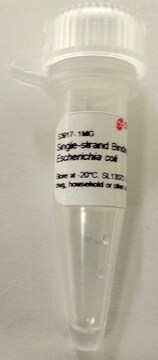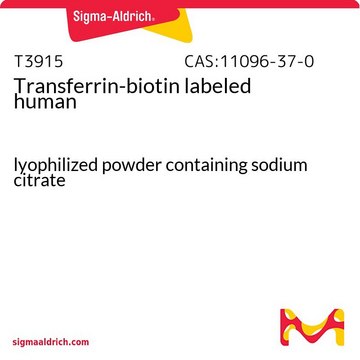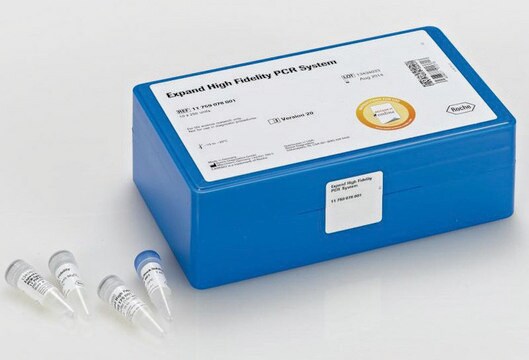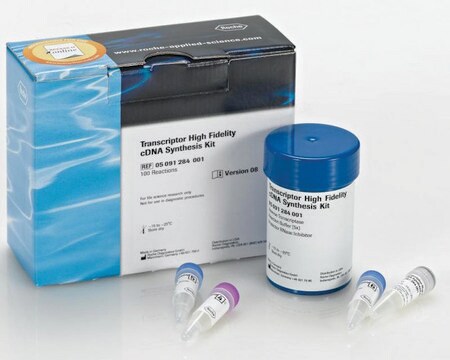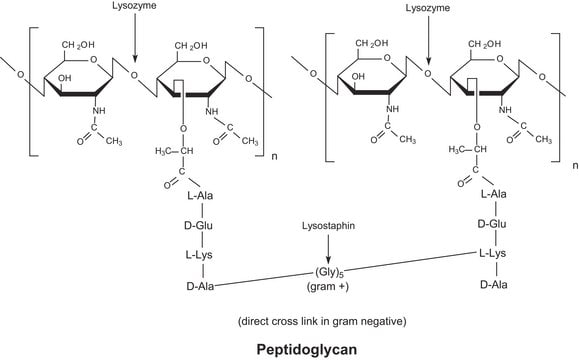T4GENE32-RO
Roche
T4 Gene 32 Protein
from Escherichia coli(infected with phage T4amN134/amBL292/amE218), solution, optimum pH ~8.0
Synonim(y):
gene 32 protein, t4
Zaloguj sięWyświetlanie cen organizacyjnych i kontraktowych
About This Item
Kod UNSPSC:
12352202
Polecane produkty
pochodzenie biologiczne
Escherichia coli (infected with phage T4amN134/amBL292/amE218)
Poziom jakości
Formularz
solution
opakowanie
pkg of 100 μg (10972983001)
pkg of 500 μg (10972991001)
producent / nazwa handlowa
Roche
optymalne pH
~8.0
temp. przechowywania
−20°C
Powiązane kategorie
Opis ogólny
T4 Gene 32 Protein is reported to improve the yield of long PCR products when 0.5 to 1.0 nmol of the protein is included in the reaction. T4 Gene 32 Protein is also reported to increase the yield of PCR products amplified from samples that contain humic acid. The inhibitory effect of humic acid is reduced by a factor of 7 when T4 Gene 32 Protein is included in the PCR (at a concentration of 2.5 μg/100 μl).
The protein is isolated from the triple-mutant T4amN134/ amBL292/ amE 219 defective for the T4 genes 33, 35, and 58 to 61.
The protein is isolated from the triple-mutant T4amN134/ amBL292/ amE 219 defective for the T4 genes 33, 35, and 58 to 61.
Specyficzność
T4 gene 32 protein is a single-strand specific, helix-destabilizing protein encoded by gene 32 of the phage T4 genome. It is required for the replication of DNA and genetic recombination in Escherichia coli cells that are infected with T4 bacteriophage.
Zastosowanie
T4 Gene 32 Protein is a single-strand-specific DNA-binding protein. It may be used for:
- Optimization of PCR (See "Product Description" below.)
- Stimulation of in vitro DNA synthesis
- Stabilization of single-stranded regions of DNA or RNA
- Site-specific mutagenesis experiments (with T4 DNA polymerase and T4 DNA ligase)
- Helping restriction enzyme digestions go to completion
- q-PCR
Jakość
Absence of contaminants
T4 gene 32 protein is incubated with various nucleic acids that serve as potential nuclease substrates. Results are analyzed by gel electrophoresis. Based on these tests, none of the following are detectable in the preparation according to the current Quality Control procedures:
T4 gene 32 protein is incubated with various nucleic acids that serve as potential nuclease substrates. Results are analyzed by gel electrophoresis. Based on these tests, none of the following are detectable in the preparation according to the current Quality Control procedures:
- nonspecific exo- and endonucleases
- single-strand DNases (nicking activities)
- single-strand-specific exonucleases
- RNases
Postać fizyczna
Protein solution, 1 - 10mg/ml, in storage buffer (20mM Tris-HCl, 100mM NaCl, 1mM EDTA, 0.5mM DTT, 50% glycerol [v/v], pH approximately 8.0)
Uwaga dotycząca przygotowania
Working concentration: 1 to 10 mg/ml
Inne uwagi
For life science research only. Not for use in diagnostic procedures.
Ta strona może zawierać tekst przetłumaczony maszynowo.
Kod klasy składowania
12 - Non Combustible Liquids
Klasa zagrożenia wodnego (WGK)
WGK 1
Temperatura zapłonu (°F)
No data available
Temperatura zapłonu (°C)
No data available
Wybierz jedną z najnowszych wersji:
Masz już ten produkt?
Dokumenty związane z niedawno zakupionymi produktami zostały zamieszczone w Bibliotece dokumentów.
M Bittner et al.
The Journal of biological chemistry, 254(19), 9565-9572 (1979-10-10)
Detailed procedures are presented which allow reproducible preparation of T4 gene 32 protein, a helix-destabilizing protein essential for DNA replication and genetic recombination in T4 bacteriophage-infected Escherichia coli cells. Although 32 protein can be purified to better than 99% homogeneity
Pauline Jacob et al.
International journal of environmental research and public health, 12(3), 2967-2983 (2015-03-13)
A two-year monitoring program of Cryptosporidium parvum oocysts, Giardia duodenalis cysts, Escherichia coli, Clostridium perfringens spores and adenovirus was conducted in three large rivers in France used for recreational activities and as a resource for drinking water production. Fifty-liter river
Nasz zespół naukowców ma doświadczenie we wszystkich obszarach badań, w tym w naukach przyrodniczych, materiałoznawstwie, syntezie chemicznej, chromatografii, analityce i wielu innych dziedzinach.
Skontaktuj się z zespołem ds. pomocy technicznej